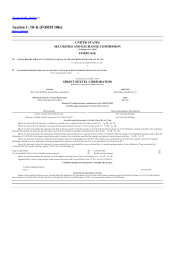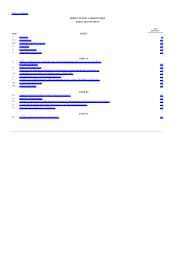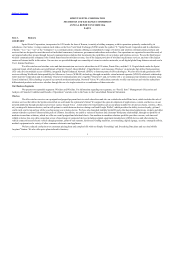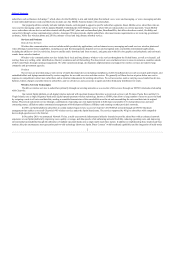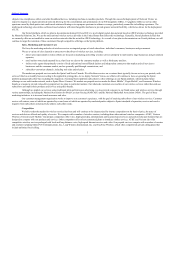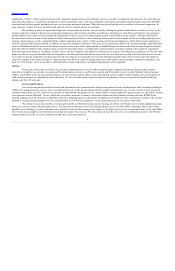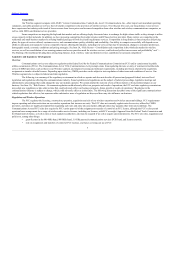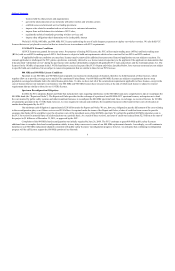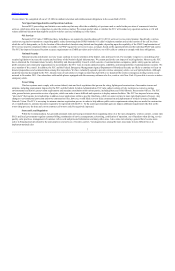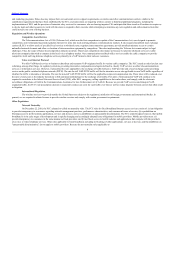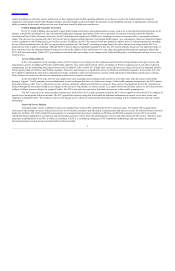Sprint - Nextel 2011 Annual Report Download - page 10
Download and view the complete annual report
Please find page 10 of the 2011 Sprint - Nextel annual report below. You can navigate through the pages in the report by either clicking on the pages listed below, or by using the keyword search tool below to find specific information within the annual report.
Table of Contents
and marketing programs. States also may impose their own universal service support requirements on wireless and other communications carriers, similar to the
contribution requirements that have been established by the FCC, and some states are requiring wireless carriers to help fund additional programs, including the
implementation of E911 and the provision of intrastate relay services for consumers who are hearing impaired. We anticipate that these trends will continue to require us
to devote legal and other resources to work with the states to respond to their concerns while attempting to minimize any new regulation and enforcement actions that
could increase our costs of doing business.
R
e
g
ulation and Wireline Operations
Competitive Local Service
The Telecommunications Act of 1996 (Telecom Act), which was the first comprehensive update of the Communications Act, was designed to promote
competition, and it eliminated legal and regulatory barriers for entry into local and long distance communications markets. It also required incumbent local exchange
carriers (ILECs) to allow resale of specified local services at wholesale rates, negotiate interconnection agreements, provide nondiscriminatory access to certain
unbundled network elements and allow co-location of interconnection equipment by competitors. The rules implementing the Telecom Act remain subject to legal
challenges. Thus, the scope of future local competition remains uncertain. These local competition rules impact us because we provide wholesale services to cable
television companies that wish to compete in the local voice telephony market. Our communications and back-office services enable the cable companies to provide
competitive local and long distance telephone services primarily in a VoIP format to their end-user customers.
Voice over Internet Protocol
We offer VoIP-based services to business subscribers and transport VoIP-originated traffic for various cable companies. The FCC issued an order late last year
reforming, among other things, its regulatory structure governing intercarrier compensation and again declined to classify VoIP services as either telecommunications
services or information services. However, it prescribed the rates applicable to the exchange of traffic between a VoIP provider and a local exchange carrier providing
service on the public switched telephone network (PSTN). The rate for toll VoIP-PSTN traffic will be the interstate access rate applicable to non-VoIP traffic regardless o
f
whether the traffic is interstate or intrastate. The rate for non-toll VoIP-PSTN traffic will be the applicable reciprocal compensation rate. These rates will be reduced over
the next several years as the industry transitions to bill-and-keep methodology for the exchange of all traffic. Providers of interconnected VoIP will continue to be
required to contribute to the federal Universal Service Fund (USF), offer E911 emergency calling capabilities to their subscribers, and comply with the electronic
surveillance obligations set forth in the Communications Assistance for Law Enforcement Act (CALEA). Because we provide VoIP services and transport VoIP-
originated traffic, the FCC's rate prescription decision is expected to reduce our costs for such traffic over time as well as reduce disputes between carriers that often result
in litigation.
International Regulation
The wireline services we provide outside the United States are subject to the regulatory jurisdiction of foreign governments and international bodies. In
general, we are required to obtain licenses to provide wireline services and comply with certain government requirements.
Other Regulations
Network Neutrality
On December 22, 2010, the FCC adopted so-called net neutrality rules. The FCC rules for fixed broadband Internet access services consist of: (a) an obligation
to provide transparency to consumers regarding network management practices, performance characteristics, and commercial terms of service; (b) a prohibition on
blocking access to lawful content, applications, services and devices; and (c) a prohibition on unreasonable discrimination. The FCC acknowledged, however, that mobile
broadband is in its early stages of development and is rapidly changing and accordingly adopted lesser obligations for mobile providers. Mobile providers must: (a)
provide transparency to consumers in the same manner as fixed providers; and (b) not block access to lawful websites and applications that compete with the provider's
own voice or video telephony services. Other rules applicable to fixed broadband, including no blocking of other applications, services or devices, and the prohibition on
"unreasonable discrimination," do not apply to mobile providers. Because the net neutrality rules applicable to
8

